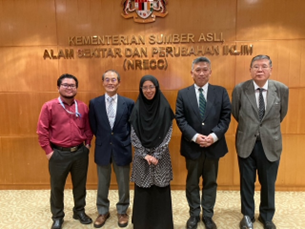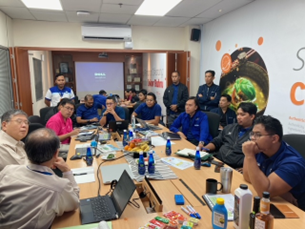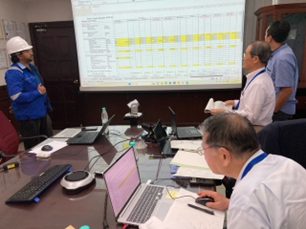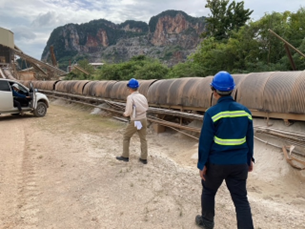ECCJ launched a project for the development of energy conservation promotion models in Malaysia
<Dispatch of experts>
Under the instruction and financial support of the Agency for Natural Resources and Energy (ANRE), the Energy Conservation Center, Japan (ECCJ) has been implementing a bilateral energy conservation cooperation project with Malaysia as an EE&C capacity building project. As one part of this project, a project which aims to develop energy conservation promotion models was started from July this year. As the first locally implemented project, during the period from December 4 to 14, implementation plans were established for three cooperating companies to enable them to form energy conservation models through developing energy management systems (EnMS) based on ISO 50001. Support was also provided regarding target setting going forward, and all activities were successfully completed.
 |
 |
|
Group photograph with Malaysian |
Discussions with the cooperating companies |
 |
 |
|
Support cooperating companies on EnMS |
On-site survey of a cooperating company factory and provision of advice for improvements |
[Details of activities] Malaysia is currently making efforts to realize the enforcement of its Energy Efficiency and Conservation Act. To guarantee the effectiveness of the efficiency achieved utilizing thermoelectric integrated management following the Act’s establishment, activities are required to support the dissemination to each business operator. However, Malaysia has insufficient experience regarding the specific means to realize the aims of the Energy Efficiency and Conservation Act. For this reason, the Malaysian government (consisting of the Ministry of Natural Resources, Environment and Climate Change, the Sustainable Energy Development Authority and the Energy Commission) collaborates with METI and ECCJ, and a project was started in July this year. In the project, energy conservation promotion models were formed with three cooperating companies through developing EnMS based on ISO 50001. By disseminating these models within Malaysia, it is intended to smoothly enforce the Energy Efficiency and Conservation Act. In this first locally implemented project, two activities were mainly implemented. One was the holding of a seminar together with the Malaysian government and three cooperating companies. In this seminar, explanations of the knowledge, etc. necessary for developing EnMS were given, in addition to sharing the objectives and targets of the project. The other was the activities conducted with the cooperating companies, in which lively discussions were held regarding the details of explanations given by each company in the seminar and advice that was provided based on the on-site investigations conducted by ECCJ. Further, it was possible to create the basis which will allow each company to formulate implementation plans through its own efforts for developing EnMS, setting energy efficiency index baselines and targets, and forming energy conservation models by building EnMS. The locally implemented activities this time in addition to the other activities which are already being implemented have led to the full-scale start of activity at each factory.

